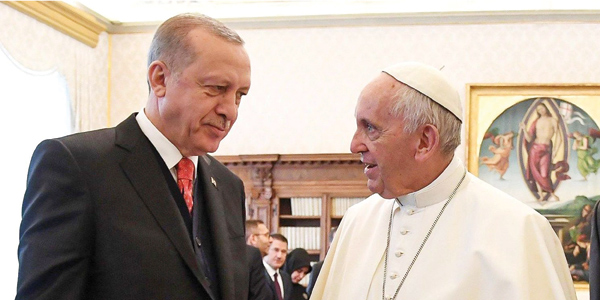The crisis in Syria is now entering its seventh year. Writing in The Guardian last week following renewed and brutal fighting in eastern Ghouta, the rebel enclave near Damascus, Raed Al Saleh, head of the Syrian White Helmet civil volunteer force, noted: “We have experienced death in so many more ways than we ever dared to imagine: we have been killed by barrel bombs, chemical weapons, starvation, drowning, torture, napalm and cluster munitions.” This has become a war fought without even the rules of war. And the international community seems to be paralysed.
A conflict that has displaced 5.5 million people is not merely a humanitarian crisis. It requires not only new approaches to conflict resolution but new approaches to the issues raised by refugee hosting. I visited Turkey as part of an academic research project that will look at the challenges and opportunities that arise in local responses to displacement, for refugees and hosts alike. In beginning to explore the complex space of refugee hosting, I met a wide range of secular and faith-based NGOs and community organisations.
Turkey is host to the largest number of refugees displaced by the Syrian conflict. On 29 April 2011 the first of what was to become 3.5 million refugees from the conflict crossed into Turkey over its southern border with Syria. Many, like Aleppo academic Mohammed, left hurriedly, expecting to be gone for a week. “I didn’t even bring my laptop,” he tells me. That was four years ago. I met Mohammed in a small café in the shadow of Istanbul’s magnificent Hagia Sofia. Istanbul is a teeming global city of 20 million people, 600,000 of which are registered as refugees from Syria. Its scale and its diversity of faces give it the feel of a country within a country.
Mohammed tells me quietly of the destruction of the Syrian academic community. Most of his university colleagues are fighting in the war, have been killed, or are refugees scattered across the globe, working predominantly in low-paid manual jobs. He taught English and since arriving in Turkey he has created a new job for himself teaching Arabic by Skype. Last month his cousin, also living in Istanbul, who works as a carpenter, failed to be paid by his Turkish employer for the third month in a row. Mohammed stretched his own income to pay his cousin’s debts. The self-reliance of refugees from Syria in Turkey is a story of both innovation and exploitation.
Mohammed’s story is not unusual. He arrived in Turkey without any sense that he had landed in his final destination. He was helped to find temporary housing in a poorer area of outer Istanbul by fellow Syrians, and, increasingly fearfully, lived off his dwindling savings until he could find work. He has access to health and education for his family, although he says that his daughter – who speaks excellent English but not yet much Turkish – is bullied at school. He is both energetic in dreaming of big ideas for his new work whilst also speaking of a profound sense of isolation and grief.
Turkish President Recep Tayyip Erdogan claims that $30 billion has been invested in refugee hosting, and the government has opened borders, public services and labour markets (with caveats and limitations) to refugees from Syria. The story of refugee hosting in Turkey is one of both strong Syrian self-reliance and large-scale central and local state provision. Several times during my visit I am told pointedly that Turkey has done what Europe has largely failed to do, even for the relatively small number of refugees it has accepted. Turkey is a high-middle income country with a highly developed and centralised system of governance. It is not a typical site for the management of a large-scale humanitarian crisis.
Turkey is a case study in the urban nature of both displacement and hosting. Ninety per cent of the 3.5 million refugees from Syria in Turkey live outside camps. The city of Kilis in south-central Turkey now has more Syrian refugees than Turkish residents. This experience brings with it opportunities for innovation, networks of support and greater self-reliance but also new forms of isolation, exploitation and social conflict. And there are plenty of examples of the latter. In many instances, it is local municipalities and neighbourhood groups who have become the focus for intense learning about refugee hosting.
While Europe has struggled with its political messaging about refugees, the Turkish government has sustained a notably positive tone. President Erdogan has spoken about the need to welcome “our Syrian brothers and sisters”. But Turkey employs this language of kinship with Syrian refugees as part of a policy that recognises the refugees as temporary guests not as rights-bearing individuals. Although it signed the 1951 Refugee Convention, Turkey did not sign the later 1967 protocol, which lifted its geographical restrictions. Refugees from Syria feel their temporary status keenly.
Public debate in Europe often glibly notes that Turkey ought to bear the brunt of refugee hosting because there is a shared culture, and potentially fewer risks of social and religious conflict. But the assumption of a shared language and culture is mistaken, and polling data show high levels of suspicion and hostility. It is also clear that refugee hosting plays into deep fault lines in contemporary Turkish life. NGOs explain that in their experience the major division in Turkey is between foreignness and Turkishness. Some Turks have a secular worldview and some take a religious worldview; which is the most authentically Turkish is increasingly bitterly contested. To belong to an international Islamic organisation seeking to work with refugees here can provoke as much suspicion as being a Christian or a secular rights-based NGO.
Turkey has witnessed significant economic development in recent decades but there is significant socio-economic inequality also, and this presents complexities for central and local government as they seek to build social cohesion. Recognising that this is no longer a situation of temporary welcome, the Turkish government has begun to talk about social “harmonisation”. At a local level, many Turks don’t want to talk about social cohesion, because it implies that the refugees are here to stay. The language of “host” and “guest” seems more comfortable; it suspends the question of what will happen in the future, making the present seem more bearable.
There is, however, a more troubling phrase that we hear many times in our conversations with those working with NGOs. They talk quietly and largely off the record about Turkey’s “shrinking humanitarian space”. This seems to be part and parcel of a more general climate of fear and distrust that pervades Turkish life since the failed military coup in July 2016 and the sharp restrictions on dissent that followed. NGOs also acknowledge there are legitimate questions – not always well handled – about the role of the Turkish government in regulating the work of humanitarian actors. The result has been fewer and more tightly controlled NGOs, with greater limitations on where and how they can work.
The Catholic community in Turkey experiences many of these issues in an acute way. Mass on Sunday morning in the nineteenth-century Latin-rite cathedral in Istanbul that has played host to both Pope Benedict and Pope Francis in recent years is attended by a mix of African and Asian economic migrants and refugees, Turkey’s other “guests”. Syrian Christians worship mainly at the Eastern rite Catholic church and in Syriac Orthodox congregations across the city. The Church’s social justice work is tightly regulated and in effect restricted; in practice this means operating through partnerships with other organisations. The emphasis is on reaching the most vulnerable. It has to negotiate a minefield of issues about foreign influence and proselytism. Nevertheless it constitutes a real but veiled presence in Turkish social care.
Here, at what was the centre of the Constantinian world, the Catholic Church seems to feel keenly its liminal and limited position. I ask a prominent church leader about the Syrian children as young as five years old playing small instruments and begging in central Istanbul. A look of agony passes over his face. He tells me he wishes to do more, but he cannot. The relationship of faith to education is at the heart of what is most difficult to negotiate in Turkey at present.
Two anxious questions are repeated across all the conversations I have: What will happen when the war in Syria ends? And, how stable will Turkey remain in the interim as it negotiates this experience of hosting? Things can change quickly here. Pride in a perceived generous response can switch to fear. Peace, internal and external, is fragile. As he finishes his grainy, sweet Turkish coffee Mohammed speaks of his fears for his family when the war ends. He is planning his work so that he could earn a living wherever he might end up. He is a contributor to the Turkish economy: he deprives no one of a living, earns in dollars and pounds sterling, and spends in Turkish lira. Mohammed does not wish to return to Syria, and he no longer hopes to reach the West. But he fears that he is condemned to make a life for himself and his family in a shrinking and volatile global space, where both rights and kindness risk running dry.
Anna Rowlands is Associate Professor in Catholic Social Thought and Practice at Durham University. Her research is funded by the Arts and Humanities Research Council and Economic and Social Research Council. Further details, including a project blog, can be found at Refugee Hosts. Follow her on Twitter @AnnaRowlands1.




 Loading ...
Loading ...
What do you think?
You can post as a subscriber user...
User Comments (0)